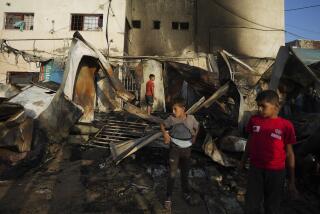Bush Urges Sharon to Keep ‘Pathway to Peace’
WASHINGTON — In careful but conspicuously pointed language, the Bush administration Monday sent a series of public signals to Israel urging “maximum restraint” and expressing deep concern about its siege of West Bank towns.
President Bush and other U.S. officials continued to call, first and foremost, on Palestinian Authority President Yasser Arafat to take decisive action to rein in extremists. Yet another suicide bombing--the sixth in six days--triggered a new round of condemnation from American officials.
“There will never be peace so long as there’s terror,” Bush told reporters Monday. “I’d like to see Arafat denounce the terrorist activities that are taking place, the constant attacks. . . . There’s a lot of innocent people who hurt in the region because of the senseless violence and senseless murder.”
But the president also took pains Monday to say that Arafat does not fit his definition of a terrorist, illustrating a key difference between the United States and Israel in their approaches to the raging Mideast violence.
Bush said he does not consider Arafat a terrorist because the Palestinian leader has agreed both to peace with Israel and to two specific, ongoing U.S. efforts--plans put forth by CIA Director George J. Tenet to achieve a cease-fire and by former Sen. George J. Mitchell (D-Maine) for resuming talks on a final settlement with Israel. Since the Sept. 11 attacks on New York and the Pentagon, Bush has repeatedly stated that anyone who supports, funds, fosters or tolerates terrorism should also be considered a terrorist.
As Israel intensified its siege of the West Bank on Monday, Bush also called on Israeli Prime Minister Ariel Sharon not to close all roads back to the peace table.
“It’s very important for the prime minister to keep a pathway to peace open, to understand that, on the one hand, Israel should protect herself and, on the other hand, there ought to be . . . the capacity to achieve a peaceful resolution to this issue. It’s important for Israel to understand that,” Bush said during a photo opportunity with Gov. George Pataki of New York and New York City Mayor Michael R. Bloomberg.
And in language cleared by the White House, the State Department said the U.S. is “gravely concerned” about the Israeli siege of West Bank towns, particularly Ramallah, where Arafat has his headquarters.
The United States decided to go public with its views Monday in part out of frustration with Israel’s failure to respond to repeated messages through diplomatic channels--from Washington and a host of other capitals, said a U.S. official who asked to remain anonymous.
“The language reflects our frustration. Humanitarian relief is being detained or delayed. Ambulances are being shot at. American citizens and an American journalist were shot at. . . . We’ve said all these things in private already,” the official said.
So the administration took the unusual step of publicly voicing concerns about the consequences of its staunch ally’s strategy.
“We deplore the killing and wounding of innocent Palestinians, and we urge Israel to use maximum restraint to avoid harm to civilians and permit access for humanitarian services,” State Department spokesman Philip T. Reeker said Monday.
It is “imperative” that the Israeli military “exercise the utmost . . . discipline,” he told reporters.
Reeker specifically cited deep concern about the shooting of “peaceful demonstrators” that injured two Americans, among others, in the West Bank town of Beit Jala on Monday. The State Department urged the Israeli government to launch a “thorough investigation” to avoid other such incidents. Reeker pointedly noted that the United States would monitor the situation.
The State Department also had tough words for the Palestinians.
“Terror, including suicide bombings, will not advance the Palestinian cause, and it brings the Palestinians and Israelis no closer to peace,” Reeker said at the daily briefing.
But he welcomed a promise from Sharon that Arafat would not be harmed. The involvement of Arafat--the Palestinians’ elected leader--and the actions of Palestinian Authority officials are critical to ending the escalating bloodshed, he said.
“We cannot lose sight of our goal: an enduring and comprehensive peace and security for Arabs and Israelis alike,” Reeker said.
More to Read
Sign up for Essential California
The most important California stories and recommendations in your inbox every morning.
You may occasionally receive promotional content from the Los Angeles Times.










